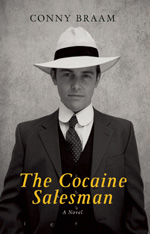
The literary landscape of World War I is so rich that it is easy to assume that there is little new left to say. However, The Cocaine Salesman's unique perspective on the conflict and its aftermath gives a startlingly fresh view on a dark period in European history.
The story concerns Lucien, a travelling salesman in the flourishing, and entirely legal, cocaine trade. During the war he sells cocaine pills with catchy titles such as 'Over the Top' to both British and German troops, and they are widely used to invigorate the men for battle. After the war Lucien watches as his trade falls into disrepute. International treaties outlaw parts of the drugs trade and Lucien's former trading partners become pushers and dealers on the fringes of the law. Both recreational users and former soldiers provide a huge pool of potential addicts for the illicit trade, and Lucien cannot prevent his own friends and family falling victim. One man in particular, Robin Ryder, becomes a focus for the post-war moral quandaries about Lucien's line of work. He is a former British soldier who becomes addicted to cocaine at the front, before finding himself taken in by Lucien's family. The relationship between Lucien, his business and Robin's addiction becomes the focal point for Braam's investigation of burgeoning drug use in the early twentieth century.
Most of the novel takes place in the Netherlands, a neutral country in World War I, but one not far from the front lines. The setting, together with Lucien's non-moral stance on his trade, gives an unusual perspective on the war, one rooted in pragmatism and the need to make a living. The book is not so much about the war, but about the nature of neutrality, whether it is in a conflict or in a questionable line of business. Lucien's journey is a mirror for the growing consumer economy of twentieth century Europe and, as such, the central premise of The Cocaine Salesman is both unique and clever.
The novel's execution, however, leaves something to be desired. The writing, and/or the translation, is starchy
and clumsy. Uninspired dialogue and a lack of spark in the writing means that the characters are difficult to
get to know. Braam's excellent idea is wasted on a wooden cast. A busy plot leads to many threads being
resolved too quickly and conveniently. The relationship between Lucien, Robin, Swanny (Lucien's sister) and
cocaine was occasionally genuinely moving, but it was interspersed with too much that lent little or nothing
to the novel. The Cocaine Salesman is a book I really wanted to like, and it is one that I read with a great
deal of interest, but perhaps with less enjoyment than its fascinating central concept deserves.

Haus Publishing, paperback, 97819007822056
